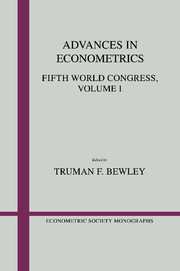Book contents
- Frontmatter
- 1 Specification testing in dynamic models
- 2 Specification tests: an overview
- 3 Kernel estimators of regression functions
- 4 Identification and consistency in semi-nonparametric regression
- 5 On econometric models with rational expectations
- 6 Calculating asset prices in three example economies
- 7 The Kalman filter: applications to forecasting and rational-expectations models
- 8 Applications of the Kalman filter in econometrics
1 - Specification testing in dynamic models
Published online by Cambridge University Press: 05 January 2013
- Frontmatter
- 1 Specification testing in dynamic models
- 2 Specification tests: an overview
- 3 Kernel estimators of regression functions
- 4 Identification and consistency in semi-nonparametric regression
- 5 On econometric models with rational expectations
- 6 Calculating asset prices in three example economies
- 7 The Kalman filter: applications to forecasting and rational-expectations models
- 8 Applications of the Kalman filter in econometrics
Summary
In this chapter we present a unified theory of specification testing that applies to a broad range of the data, model, and estimator configurations likely to be met in econometric practice. The abstract results are applied to obtain specification tests based on maximum-likelihood estimators for the parameters of dynamic models. We propose a dynamic information matrix test that should be useful for detecting dynamic misspecification in a wide variety of models and discuss its interpretation in a number of simple special cases. We also propose some new, computationally convenient versions of the Hausman test.
Introduction
Over the past several years there has been a substantial amount of attention directed to the consequences and detection of specification problems in econometric modeling and estimation. Although the literature is now quite extensive [see, e.g., Ruud (1984)], recent work of Newey (1985) and Tauchen (1984) has provided a single unifying framework in which most available results on specification testing can be embedded as special cases. This unification is available, strictly speaking, for the convenient and insightful context of independent: and identically distributed (i.i.d.) observations. Economic data are rarely obtained in such a way that the i.i.d. assumption is realistic. Instead, they may be quite arbitrary stochastic processes.
The purpose of this chapter is to present an extension of this unified framework for specification testing that allows for more realistic economic-data-generating processes.
- Type
- Chapter
- Information
- Advances in EconometricsFifth World Congress, pp. 1 - 58Publisher: Cambridge University PressPrint publication year: 1987
- 27
- Cited by



